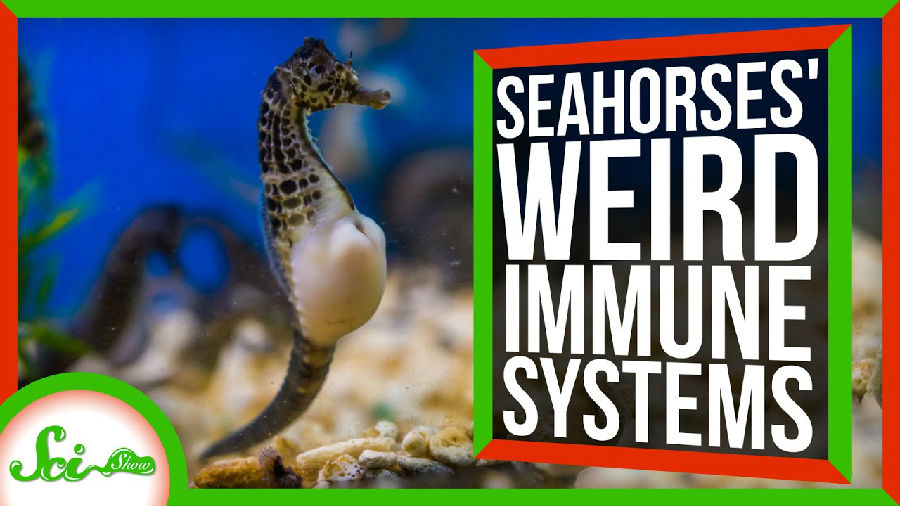(单词翻译:单击)
In many fish species, males are the primary if not sole parent.
在众多鱼类中,即使不是单亲,雄性也是主要的那一个。
But male seahorses, sea dragons, and pipefish in the family Syngnathidae take fatherhood to a whole new level.
但海龙鱼科家族中的雄性海马、海龙和尖嘴鱼将父亲的地位上升到了一个全新的水平。
They have embraced the role of incubator, too.
它们也接受了孵化员的这一角色。
And in some species, the males actually experience a full blown pregnancy, complete with giving birth to live young.
在一些种类中,雄性实际上经历了一个完整的怀孕过程,最终生下幼崽。
This feat has required some interesting modifications, including alterations to a really important part of their immune systems.
这一壮举需要一些有趣的修正,包括对免疫系统的一个非常重要部分的改变。
And learning more about how male pregnancy is even possible in these fishes
更多地了解这些雄性鱼类如何怀孕
could help us better understand our own immune systems and how to help when they falter, like when they're attacked by HIV.
可以帮助我们更好的理解我们自己的免疫系统,以及在免疫系统衰退时,如何提供帮助,比如当它们被HIV攻击时。
Now, you might think of pregnancies as pretty run-of-the-mill, considering they happen in our species all the time.
你可能会认为怀孕是很平常的,因为我们这个物种,怀孕很普遍。
But there are a number of challenges to overcome for a pregnancy to be successful.
但怀孕成功要克服很多的困难。
Arguably one of the biggest is keeping the parent's immune system from rejecting the fetus,
最大的问题之一就是防止父母的免疫系统排斥胎儿,
since from the body's perspective, a fetus is half-foreign. And that's basically what immune systems are for—getting rid of foreign material.
因为从身体的角度来看,胎儿算是半个外来者。这就是免疫系统的基本功能——清除外来物质。
The immune systems in vertebrates like us and fish are especially good at this because of something called adaptive immunity.
人类和鱼类等脊椎动物的免疫系统对此尤为擅长,因为一些被称为适应性免疫的物质。
That's a whole arm of the immune system that protects us against specific pathogens.
这是免疫系统的一部分,保护我们不受特定病原体的伤害。
It also creates a memory of our experiences with them, to help protect against potential future encounters.
它还会为我们和它们的经历创造回忆,以帮助防范未来可能的遭遇。
But it can't really discriminate between "good" and "bad" encounters
但它不能区分好的和坏的经历,
so in theory, a fetus should trigger the same alarm as a deadly virus. But most of the time, it doesn't.
所以理论上,胎儿应该会和致命病毒一样触发相同的警报。但大多数时候,并不是这样。
It wasn't until 2012 that researchers figured out why.
直到2012年,研究人员才弄清楚原因。
It turns out that pregnant mammals' bodies tamp down on the activity of genes that control adaptive immunity
结果证明怀孕哺乳动物的身体抑制了控制适应性免疫基因的活动,
to ensure they don't eject the partial-foreigners from their wombs.
以确保它们不会驱逐来自子宫的半外来者。
And in a 2020 study, it was discovered that pregnant seahorses and pipefish have adopted a similar strategy, with a slightly dramatic twist.
在2020年的一项研究中,还发现怀孕海马和尖嘴鱼已经适应了一种类似策略,只不过略微有些戏剧性的转变。
Now, before I reveal that twist, it's important to understand that some of the most important genes
在我揭晓这个转变前,重要的是要了解,适应性免疫系统中的一些最重要的基因
in the adaptive immune system are found in a region of the genome called the Major Histocompatibility Complex, or MHC for short.
发现于基因组一个区域——主要组织相容性复合体,简称MHC。

The MHC is made up of three classes of genes, which are super creatively named MHC I, II, and III.
MHC由三种等级的基因组成,它们被创造性地命名为MHC I、II和III。
Each of these codes for important proteins, but MHC II proteins are especially important:
每一种都编码成了重要蛋白质,但MHC II蛋白质尤为重要:
They go on the outside of many cells, and are responsible for sounding the alarm when an invader is spotted.
它们位于许多细胞的外部,当发现入侵者时,负责发出警报。
Specifically, they bind to proteins called CD4 receptors on other immune cells that come to help, passing along insider knowledge about the invader.
尤其是,它们与其他免疫细胞上称为CD4受体的蛋白质结合,从而传递有关入侵者的内部信息。
That way, the body can launch an effective assault and remember the foe in case it ever dares to show its face again.
这样,身体可以发起有效攻击,并记住敌人,以防敌人胆敢再次露面。
Now, during a mammalian pregnancy, the MHC genes are down-regulated,
在哺乳动物怀孕期间,MHC基因被下调,
taking the immune system off high alert so it doesn't attack the fetus.
解除免疫系统的高度戒备,所以它就不会攻击胎儿。
The fetus is also surrounded by a layer of specialized cells called trophoblasts, which don't have MHC IIs,
胎儿也会被一层滋养细胞包围,滋养细胞没有MHC II,
so they help shield the embryo from the parent's immune cells.
所以它们帮助保护胚胎不受母体免疫细胞的伤害。
Pregnant seahorses and pipefish also down-regulate MHC genes in general, but they don't stop there.
怀孕海马和尖嘴鱼也都下调了MHC基因,但却不止于此。
They've completely ditched MHC II genes altogether.
它们已经完全抛弃了MHC II基因。
Living without these genes is kind of like the immune system equivalent of living without a vital organ.
没有这些基因就好像免疫系统中没有重要器官一样。
Based on our current understanding of the adaptive immune system, without MHC II,
基于我们对适应性免疫系统目前的了解,没有了MHC II,
these fish should not be able to remember pathogens and protect themselves against them.
这些鱼应该记不住病原体,也无法保护自己不受它们的伤害。
Which is kind of a head scratcher, considering these fish spend their entire lives in water where viruses are the most abundant thing around.
这有点让人头疼,因为这些鱼一生都生活在病毒最丰富的水中。
The discovery that they're able to survive in this environment without a vital part of their immune system was downright shocking to researchers.
它们能够在免疫系统缺乏一个重要部分的环境中存活,这对研究人员来说十分令人震惊。
Though, they quickly realized that the adaptive immune system is probably more flexible
他们很快意识到,适应性免疫系统可能比他们原以为的更加灵活,
than they'd originally thought and can still be effective without MHC II.
并且没有MHC II仍然有效。
This newfound flexibility could give us a better understanding of our own immune system
这种新发现的灵活性让我们能够更好地理解自己的免疫系统,
and provide new ways of treating a variety of diseases. But especially, it could help us tackle HIV infections.
并提供治疗各种疾病的新方法。尤其是可以帮助我们对付HIV感染。
You see, human immunodeficiency virus replicates in cells that have CD4 receptors on their surface.
人体免疫缺损病毒在表面有CD4受体的细胞中进行复制。
And it replicates at significantly higher levels when those cell's CD4 receptors are attached to MHC II proteins.
当这些细胞的CD4受体附着在MHC II蛋白上时,它就会以更高的水平复制。
So, basically, the virus has figured out a way to make one of the most important parts of our immune system work against us.
病毒已经找到了一种方法,让我们免疫系统最重要的部分抵抗我们。
But, if we really understood how seahorses can ditch MHC II genes without compromising overall immunity,
但如果我们真的知道了海马如何能够在不牺牲整体免疫力的情况下放弃MHC II基因的,
maybe we could find a way to deprive HIV of what it needs most. And that's just one example.
或许我们就能找到一种方法来剥夺HIV最需要的东西。这只是一个例子。
There are other kinds of immune deficiencies that involve MHC II, so maybe, studying seahorses will help us develop better treatments for them.
还有其他涉及MHC II的免疫缺陷,所以或许研究海马将帮助我们开发更好的治疗方法。
Plus, MHC II proteins are major players in a number of different diseases, especially autoimmune conditions.
此外,MHC II蛋白质在很多不同疾病中都起着重要作用,尤其是自体免疫性疾病。
So, by understanding seahorse fatherhood better, we can better equip ourselves to tackle things like diabetes, celiac disease, and lupus.
因此,通过更好地了解海马父亲,我们可以更好地装备自己来应对糖尿病、乳糜泻和狼疮等疾病。
Who knew all of that could come from studying a little fishy father?
谁能想到所有这些都来自对一种小小的鱼类父亲的研究呢?
Thanks for watching this episode of SciShow! If you want to learn more awesome things about fish,
感谢收看本期节目。如果你想了解更多关于鱼类的知识,
you may want to check out our episode on three fish with unexpected abilities.
或许可以看看关于有特殊能力的鱼的那一期节目。
And before I go, I want to give a quick shout out to our patrons! We think you're all fintastic, and we really appreciate your continued support.
结束前,我想呼唤一些我们的赞助人!你们非常棒,真的非常感谢大家一直以来的支持。
If you're not a patron but want to learn more about the community, you can head on over to Patreon.com/SciShow.
如果你还不是我们的赞助人,但你想了解这个社群,可以登录Patreon.com/SciShow。


